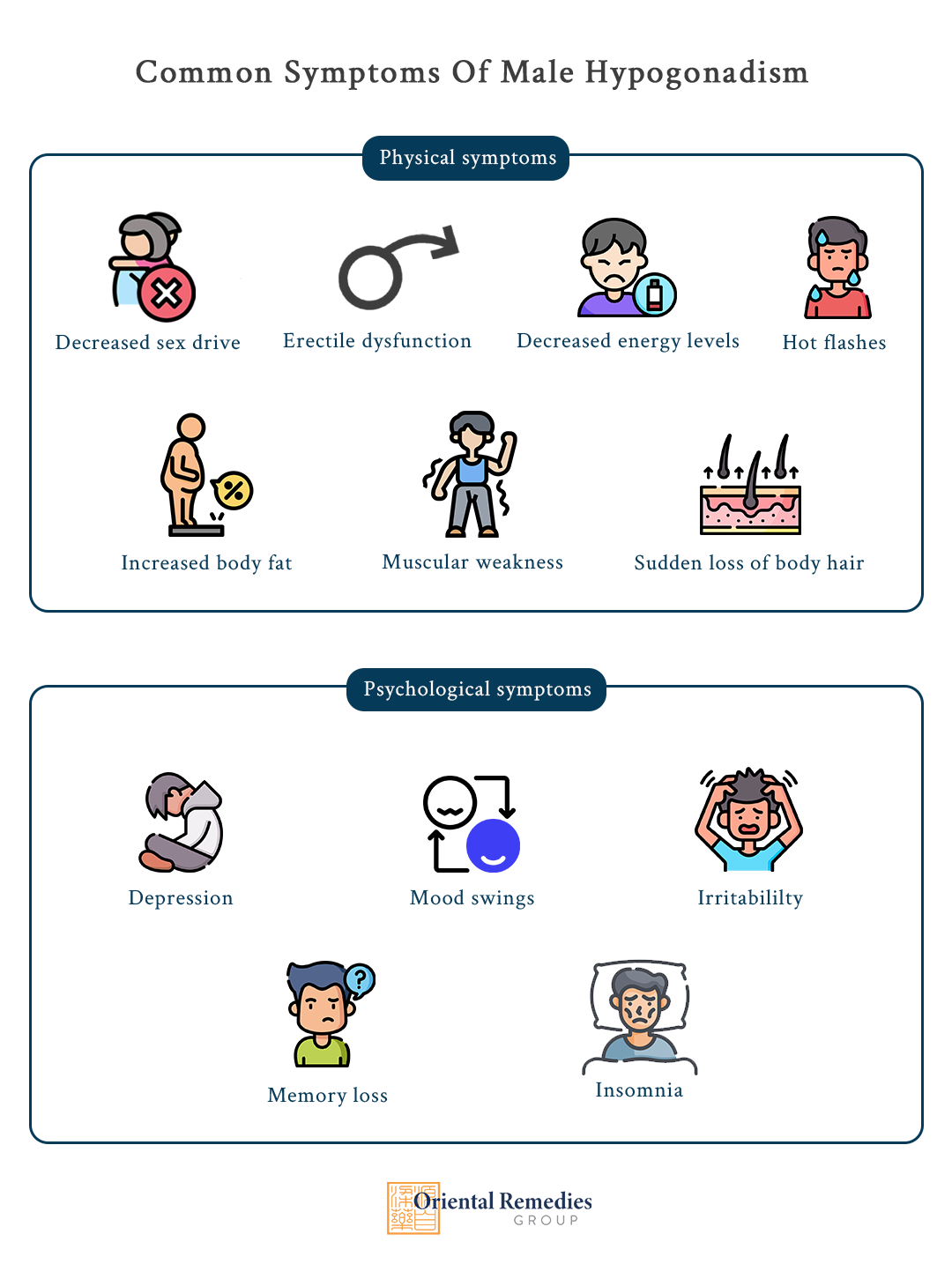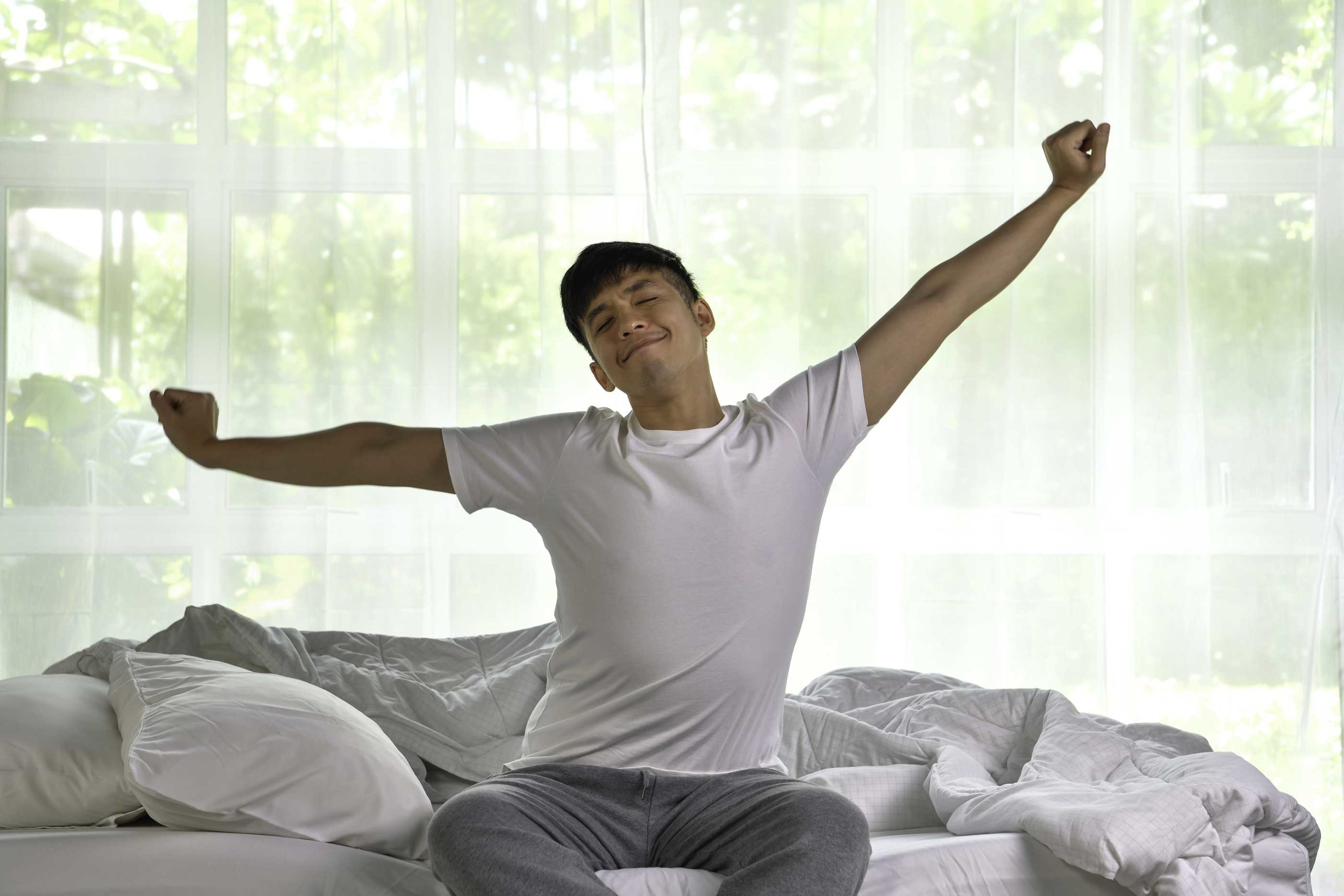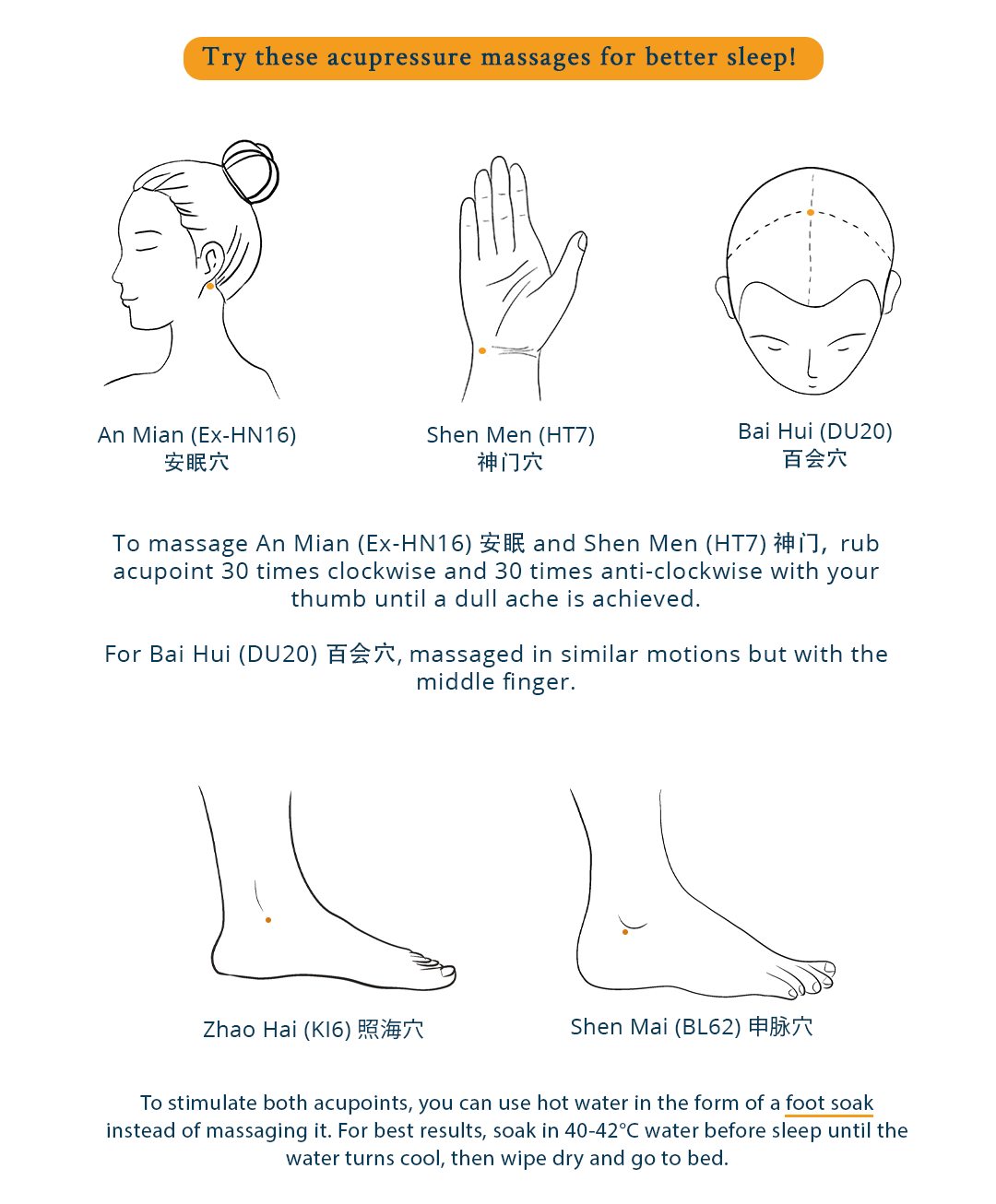Are you between the ages of 40 and 55 and your partner is telling you that you have been more irritable and moody? Is your energy level lower than usual and your sexual function not like before? Do you also notice an increase in your waistline? If the answer is yes to many of the above, you might be suffering from andropause!
Andropause is medically known as male hypogonadism – a medical condition where the body does not produce enough testosterone in adulthood [1]. With male hypogonadism, males experience effects of decreased testosterone levels[2] which affects them physically and psychologically when their testosterone levels dip.
Male hypogonadism can occur when testosterone levels change due to age. Although this change usually occurs between the ages of 40 to 55, it can sometimes happen as early as 35 years of age or as late as 60 or more.

In the perspective of Traditional Chinese Medicine, the development of a man’s health is closely tied to the number 8. Under the teachings of the Yellow Emperor’s Canon of Internal Medicine Chapter 1 《黄帝内经》素问ㆍ 第一篇《上古天真论》, it is mentioned that changes in a man’s body occurs in phases of every 8 years. A man reaches his puberty phase at age 16 (phase 2) and reaches the pinnacle of his health at age 32 (phase 4) and his health will start to decline ever more so at every multiple of 8 thereafter. At age 40 (phase 5), his Kidney Qi weakens and he will begin to lose his hair and his teeth withers. At age 48 (phase 6), his Yang Qi will gradually weaken from the upper body, the face loses its radiance and the hair on his sideburns will begin to turn grey. The ancient text mentions the bodily changes that will occur in men but excludes the emotional and psychological changes. However, through modern researches, we manage to find out that there is a progressive reduction in testosterone levels as men ages and this reduction in testosterone levels is affecting our mood and emotions.[3]
The decline of testosterone levels can typically begin in men after the age of 40, along with the weakening of the Kidney Qi. As the decline of testosterone levels is a slow and progressive process where the body adjusts to the change in testosterone levels, it can usually last longer (15-20 years) in contrast to the female menopause. However, the symptoms are not as erratic as the female menopause. But one thing to note is that not all men will experience the effects of declining testosterone levels. However, if you do, here’s how you can manage the effects of decreased testosterone:
5 Ways to manage your hypogonadism symptoms:
- Adopt healthy sleeping habits

According to the Journal of the American Medical Association (JAMA), sleep restriction causes decreased testosterone levels.[4] Couple this to the fact that most of the testosterone released in men occurs during sleep[5] and you get a potent double whammy to your testosterone simply by having insufficient sleep. Hence, getting good quality sleep is paramount to having healthy testosterone levels.

Some Do’s and Don’ts for getting good sleep include:
| DO | DON’T |
| Take magnesium supplements to help you relax, Vitamin B complex to help with production of melatonin, or take Sleep Essentials by Oriental Remedies Group to help with your sleep. | Have too much screen time before bedtime as blue light can affect melatonin production. |
| Have a sleep routine with activities like meditation or taking a warm bath to tell your brain that these activities are precursors to sleep. | Engage in strenuous exercise or consume caffeine close to bedtime. |
| Keep the bedroom cool thereby helping the body cool down to enter sleep faster. | Eat a large meal before bed as it can lead to acid reflux when you lie down thereby disrupting sleep. |
An insomniac can also seek alternative treatments using TCM to manage sleep issues.
For more sleep tips: Insomnia – Don’t Sleep On Your Sleep Disorder
- Manage your emotions and have a healthy stress level

Based on a study done on salivary testosterone levels of individuals under psychological stress, there is a positive association between stress and testosterone at low levels of stress.[6] However, at high levels of stress, the relationship is negative and eventually levels off.
Therefore, it is very important to be aware of the changes in your emotions and stress levels. In a period of increasing stress levels, you should consider catching up on some stress-relief activities such as exercises and taking part in activities you enjoy.
If, despite your best efforts in mitigating stress, you still find yourself in an emotional turmoil, it could be good to seek professional advice from a counsellor or certified psycho-therapist. They will help uncover past trauma which can help you feel better about yourself and help solve emotional and psychological problems at its root.
You can also seek TCM help to manage stress through the use of acupuncture. Acupuncture is used to release endorphins, creating a sense of calmness. It also regulates the part of the brain that governs serotonin, a neurotransmitter that is associated with mood[7].
- Regular exercises

Diet and exercise can play a huge role in reducing the symptoms of male menopause. Exercise, in particular, is a powerful tool in slowing the loss of muscle mass that is common to men in their middle age. Loss of muscle mass also contributes to the reduction of testosterone levels in the body, so exercise can help slow the decrease of testosterone production.
Regular exercise also releases endorphins that can help promote a sense of well-being and reduce the instances of depression and mood swings common to decreased testosterone. High-intensity training not only increases one’s metabolism but also boosts the body’s own production of human growth hormone, which also decreases symptoms of hypogonadism.
Strength and weight training are the best ways to naturally boost your testosterone levels. Studies have found that 12 weeks of resistance training results in an increase in levels of testosterone after the workout sessions.[8]
There are a variety of weightlifting exercises you can attempt such as push-ups, squats, hip thrusts, bench presses and deadlifts. Alternatively, if you are not a fan of weightlifting exercises, consider trying High-Intensity Interval Training (HIIT) like mountain climbers, burpees, high knees, sprints or even bicycle crunches.
For any individuals starting a workout regime after being sedentary for some time can be challenging. The lactic acid build-up and micro-tears in the muscles post-workout can be debilitating and cause delayed-onset muscle soreness (DOMS) lasting 2-3 days. Electro-Lymphatic therapy (ELT) can help alleviate the burn felt in muscles due to lactic acid by strengthening lymphatic circulation to raise the lactate threshold as well as improve the recovery from muscle fatigue. ELT stimulates good lymphatic drainage that can help reduce the accumulation of interstitial fluid. This reduces swelling and inflammation at the muscles, alleviating the symptoms of DOMS faster.
- Healthy and balanced diet

A common advice given to tackle health-related issues is to have a healthy and balanced diet, however the importance of a regulated diet is often underestimated.
In TCM, we believe that the characteristics of the food we eat have a corresponding effect on our body. For instance, consuming too much food with cooling properties may cause Phlegm and Dampness to build up in our body while too much food with warming properties may contribute to ‘heat’ symptoms like irritability, sore throat and insomnia. Food that is overly oily also tends to be harder to digest, causing our digestive system to overwork. When our digestive system is taxed, absorption of food is also affected which further impacts our health.
That said, the effects of diet on our body is often more than just the type of food we eat, but also how much we consume and how we consume them. Charred, burnt food is just as bad as under-prepared food. Frequent barbequed meals increase our exposure to carcinogens while under-cooked food exposes us to parasites and bacteria.
From a nutritional standpoint, a diet high in fibre, vitamins and minerals is essential for health and wellness. A similar diet that limits the amount of inflammatory oils and sugar helps reduce the amount of inflammation that goes on in our body which has a detrimental effect on our hormonal health. Since the Kidney is responsible for hormonal and sexual health in our body, food black in colour are often used to help nourish and tonify the Kidney.
Try this delicious Kidney-nourishing tonic soup made with black beans, Du Zhong 杜仲, spare ribs and some red/black dates!
Steps:
- Steep 40g of black beans overnight
- Blanch the spare ribs (400g)
- Place the black beans, spare ribs, 30g of Du Zhong, 6 red/black dates into a pot and add 2 litres of water
- Let the soup simmer for 3 hours and add salt to taste
Your healing is the most important!
At Oriental Remedies Group, our physicians are trained in both Biomedical Science and TCM at Nanyang Technological University (Singapore) and China for a minimum of 5-8 years before being certified to practice in Singapore.
If you or a loved one is suffering from male hypogonadism or general health and wellness issues, we would like to help. Please contact us at +65 8087 0486 for a personalized consultation.
—–
This article is written by Physician Lim Jing Yang.
Physician Lim is a TCM physician at Oriental Remedies Group, a patient-centred healthcare provider offering effective treatments grounded in TCM and enhanced with medical technology.

Note: all words in Italics mentioned henceforth refer to the TCM organ system and not the anatomical organs/terms referenced in western medicine.
Disclaimer:
The information on this page is for information and educational purposes only. Such medical information may relate to disease, injury, drugs and other treatments, medical devices and/or health products. Medical information does not amount to advice, and if advice is needed an appropriate professional help should be sought. The disclaimer asserts that no warranties or representations are given in respect of the medical information, and that the website operator should not be held liable if a user suffers any injury or loss after relying upon the medical information.
All wellness assessments and technology-enhanced therapies using wellness device(s) are intended for use only for general well-being purposes or to encourage or maintain a healthy lifestyle, and it is not intended to be used for any medical purposes (such as detection, diagnosis, monitoring, management or treatment of any medical condition or disease). Any health-related information provided by these devices should not be treated as a medical advice. Please consult a physician for any medical advice required.
References:
[1] https://www.mayoclinic.org/diseases-conditions/male-hypogonadism/symptoms-causes/syc-20354881 9
[2] https://www.nhs.uk/conditions/male-menopause/
[3] https://www.tandfonline.com/doi/abs/10.3109/15622970309167905
[5] https://jamanetwork.com/journals/jama/fullarticle/1029127

